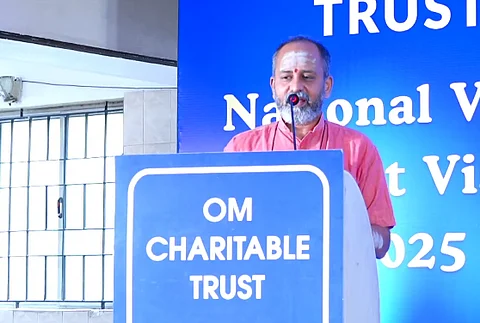

Follow TNM’s WhatsApp channel for news updates and story links.
Delivering an impassioned address at a national Vedic talent meet on July 19, Justice GR Swaminathan of the Madras High Court, narrated how helping a man's acquittal in a case taught him a profound lesson: the Vedas will protect those who protect them.
"If you protect the Vedas, the Vedas will protect you," he told a hall packed with young scholars. He concluded, "Seeing this audience, I have a hope that Sanatana Dharma will live forever in India."
Justice GR Swaminathan is currently in the news for presiding over a contempt proceeding against senior advocate S Vanchinathan. Vanchinathan had accused the judge of caste and communal bias in a letter to the Chief Justice of India.
At the Vedic event, Justice Swaminathan said that he hails from a family steeped in Vedic learning. “That is my only qualification to be here,” he said, speaking of his lineage of Vedic scholars.
He recounted three turning points in his life that reaffirmed his spiritual convictions. The first incident involved an acquaintance of his.
“A person I knew for a very long time, who had studied the Vedas for seven years and lived his life strictly according to Sanatana Dharma, came to my house one day. He was standing in front of me, tears in his eyes, unable to speak. I told him, ‘You can talk freely with me. Just like a doctor and patient, or a lawyer and client, our conversation is confidential’,” he said.
It turned out the man had taken the blame for a fatal road accident caused by his sister, who was visiting from the US. She had lost control of the car and hit a man near a tea shop. To prevent complications for her, the man falsely confessed to the crime and was convicted, receiving an 18-month prison sentence — unusually harsh, Justice Swaminathan noted, for such a case.
“He said he got that sentence because he had a kudumi,” the judge recalled, referring to the traditional tuft of hair maintained by Brahmins.
Justice Swaminathan, who was a practicing lawyer at that time, examined the case documents. “All six witnesses simply said: ‘A Maruti car came speeding and hit a man.’ No one identified the driver. Not in their statements, not in court,” he said. He then took up the case in the appellate court where, coincidentally, the presiding judge was his classmate. The conviction was overturned, and his friend was acquitted.
“That day changed me,” the judge said. “Until then, I didn’t take such matters very seriously. But that moment made me realise the truth in our belief — that if you protect the Vedas, the Vedas will protect you.”
The second anecdote involved a government-assigned driver, Badshah, while Justice Swaminathan was in Chennai. “I went home for lunch, and asked him to come back by 1.30 pm, to which he said, ‘Sir, it’s Friday. I need to go for prayers, and I’m new here, I don’t know where the mosque is, so it might take longer. Shall we go by 2 pm?’ I admired his clarity of purpose,” he said.
The third story was about former Chief Minister Rajagopalachari, also known as Rajaji. “Recently, I read a news article that said the Chief Minister had to decide who would be appointed as chief Haji. Five people had applied. The interview was at 11 am, but Rajaji couldn’t come due to some work. He came by 12.30 pm and saw that only four people were present. When he asked where the fifth person was, the PA said, ‘He left to attend Friday prayers.’ Rajaji immediately said, ‘Appoint him only.’ That’s the kind of integrity he appreciated.”
“Seeing these instances made me reflect. Shouldn’t I be equally committed to mine?, and do my sandhya vandanam everyday?” the judge said. Sandhya vandanam is a daily prayer ritual performed by Brahmins.
The complaint against Justice Swaminathan
On June 14, Vanchinathan under the banner of rights group People's Rights Protection Centre, wrote to the CJI levelling 15 serious allegations against Justice Swaminathan, including caste bias, ideological partisanship, and communal prejudice — particularly in the context of his handling of the Lavanya suicide case and comments on non-Brahmin temple priests.
On Monday, July 28, Justice Swaminathan insulted Vanchinathan calling him a ‘comedy piece’. He remarked, “I don’t know who called you all revolutionary. You are all comedy pieces.”
The hearing has sparked a public and institutional debate. Seven retired judges expressed support for Vanchinathan, cautioning that only the Chief Justice of India can initiate action on such complaints through the in-house procedure. But Justice Swaminathan stood firm: “We are also conscious of the rules of procedure. We are not fools… We will not be intimidated or cowed down. Judicial independence is supreme.”